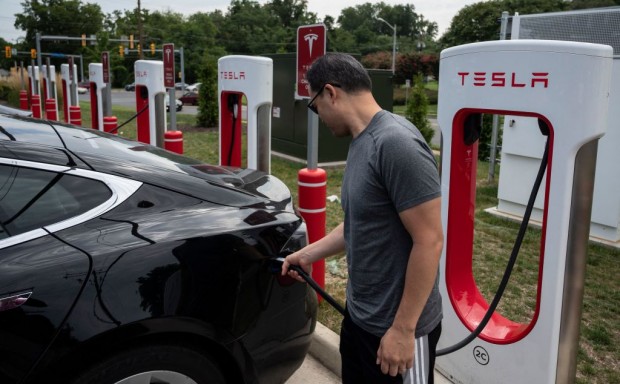A man charges his car at a Tesla super charging station in Arlington, Virginia on August 13, 2021.
(Photo : ANDREW CABALLERO-REYNOLDS/AFP via Getty Images)
Tesla has recalled 53,822 cars and SUVs in the United States because of a feature that lets vehicles automatically roll past stop signs. According to records published by the National Highway Traffic Safety Administration (NHTSA) on Tuesday, February 1, Tesla will disable the feature on its so-called Full Self-Driving Beta (or FSD Beta) software with an over-the-internet update.
The cars affected by the recall are Tesla's Model S, X, 3, and Y vehicles. The recall covers X SUVs and Model S sedans from 2016 to 2022 and 2020 through 2022 Model Y SUVs and 2017 to 2022 Model 3 sedans.
The cars in question have been given a relatively new version of the company's FSD Beta software. The newer versions of FSD Beta (2020.40.4.10 or later) give Tesla drivers a "rolling stop" feature that lets their vehicles automatically roll through an all-way stop intersection without first coming to a complete halt.
Rolling stop feature increases the risk of a crash
According to the NHTSA, this function can "increase the risk of a crash." This particular feature allows cars to go through intersections with all-way stop signs at a speed of up to 5.6 miles (9 kilometers) per hour.
The agency said that the "Vehicle Safety Act prohibits manufacturers from selling vehicles with defects posing unreasonable risks to safety, including intentional design choices that are unsafe." NHTSA added that it would act immediately on an issue if the information shows that a safety risk may exist.
According to the recall documents, Tesla appears to have programmed its cars to violate the law in most states, where police will issue drivers' tickets to disregard stop signs. The Governors Highway Safety Association said that it is not aware of any state where a rolling stop is legal.
The documents also showed the NHTSA meeting with Tesla executives on January 10 and 19 to discuss how the software operates. Tesla eventually agreed to the recall after these two meetings with U.S. safety regulators, with the company agreeing to disable the rolling stops with a software update on January 20.
Related Article: Kia Carens Set to Launch Soon After Mass Production Starts in Anantapur Assembly Line in India
Tesla reports no injuries or crashes relating to the software issue
A week later, Tesla gave an update to the NHTSA regarding the problematic feature, saying that it is not aware of any warranty claims, field reports, crashes, injuries, or fatalities related to this condition as of January 27, 2022.
Customers affected by the recall do not have to take their Tesla cars to a store or service center to address the issue as the world's leading electric car maker will remove these features via a free over-the-air software update.
In its most recent earnings update on January 26, Tesla divulged that it had expanded this controversial testing program to around 60,000 cars in the United States. Elon Musk said during that earnings call that Full Self-Driving would become the most important source of profitability for Tesla over time.
READ MORE ON AWN:
Castroneves Wins Again as Meyer Shank Racing Acura Arx-05 Captures Rolex 24 at Daytona
See Now: OnePlus 6: How Different Will It Be From OnePlus 5?



























